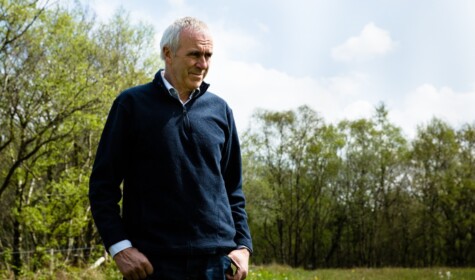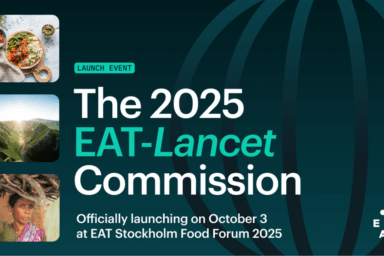SFT CEO and organic farmer, Patrick Holden, outlines his key food and farming policy recommendations for Sir Keir Starmer and the new Labour Government, and the need for a ‘revolutionary vision’.
As a farmer in Wales and CEO of the Sustainable Food Trust, I have both a bird’s and worm’s eye view of food and farming, and from this uncommon vantage point it feels that they could be defining issues for Sir Keir Starmer and his Government.
Labour has a history of driving radical change in this area. At the end of the Second World War, Clement Attlee’s Government made food and health central pillars of his efforts to rebuild the nation and create a better future. With our current food and farming systems impacting ever more negatively on the health of people and planet, we need a similarly revolutionary vision now – and Keir Starmer’s personal leadership is critical to this.
I feel strongly that food and farming are central to achieving many of this Government’s most important goals, from the preventative health agenda to action on climate change, reviving our nature and rivers, the Green Growth agenda and national food security.
By shifting to regenerative farming systems that operate in harmony with nature, Britain could become a world leader, pioneering a new approach that combats climate change and protects nature, while delivering food security and helping to tackle poor health and poverty.
An investment in truly regenerative farming is undoubtedly an investment in the nation’s health. Today, the NHS is spending billions treating the symptoms of declining public health, including many previously uncommon diseases such as obesity, diabetes, food intolerances and cancer, all of which have been exacerbated by industrial farming methods and foods.
An investment in sustainable agriculture is also an investment in combatting climate change. By using regenerative practices to draw carbon down from the atmosphere and back into the soil, some estimates suggest we could sequester more than half of total annual greenhouse gas emissions globally.
But to transform our food and farming system and enable it to engender impactful change, we need a shared bold vision and an interconnected strategy that goes beyond any one ministry.
The Government should convene a ‘Food and Farming Council’, which would bring together the Chancellor, Secretaries of State and Ministers from various departments with a broad spectrum of stakeholders from the food system, including businesses, farmers and NGOs.
This Council should then demonstrate the same level of leadership in transitioning towards sustainable agriculture, as witnessed in the energy sector. In the early 2000s, the German government ingeniously convinced major fossil-fuel energy companies to subsidise feed-in tariffs, thereby overcoming the initial cost barrier until economies of scale eventually made renewable energy more affordable than nuclear and fossil-fuel power. Our Government urgently needs a similar approach to jumpstart the transition in agriculture, and the solution is within reach.
The food companies, retailers and other businesses who have a vested interest in ‘testing the waters’ of a transition, have the combined resources to create new models and templates for sustainable food production, and together can help shift the balance of financial advantage from extractive to regenerative production.
There are already instances of this transition in action, visible right on my farm in West Wales. Castell Howell, one of the largest food wholesalers in Wales, has recently initiated a pilot project to introduce organic vegetables into schools. They are funding the production and distribution of these vegetables, in my case carrots, using profits from their conventional trade. They are investing in this initiative because they recognise the long-term financial benefits of being pioneers in this area.
Many other players in the corporate world can support the transition by working together in new alliances. For example, members of the Sustainable Markets Initiative (SMI), which was launched by the then Prince of Wales in 2020 and includes banks, asset managers, insurance companies and water companies, are now partnering with food companies and retailers to co-finance new initiatives that reward farmers for delivering on climate, nature and health.
The Government must also play its part by removing barriers to change. Here are three actions that Government could take:
- Back a large-scale pilot of a new approach to finance regenerative agriculture: through the SMI, the Sustainable Food Trust is working with a group of CEOs from some of the UK’s most influential companies, including McDonald’s, McCain, Pepsi, Waitrose, Lloyds Banking Group and Lloyds of London to develop and run this pilot. The support of the Government and Defra could greatly boost the impact of this work.
- Link farm subsidies to measurement: the Environmental Land Management scheme has some positive attributes, but not enough money has been allocated to enable systemic change of the farming system. More money, combined with the use of common, holistic metrics, must underpin these schemes and determine what they can achieve. The Sustainable Food Trust has incubated the Global Farm Metric, a common framework co-created across the food and farming sector, which is now being deployed in trials across the world.
- Introduce a stronger regulatory framework: apply the polluter pays principle to those who buy inputs that contribute to climate change, pollute water and damage human health. This would create a level playing field for farmers who are doing the right thing.
If the Government acted on these fronts and enabled a shift from chemical to biologically based food production, they could rightly be seen as world leaders in this great food and farming transition.
This article was originally published by Goals House on LinkedIn.







